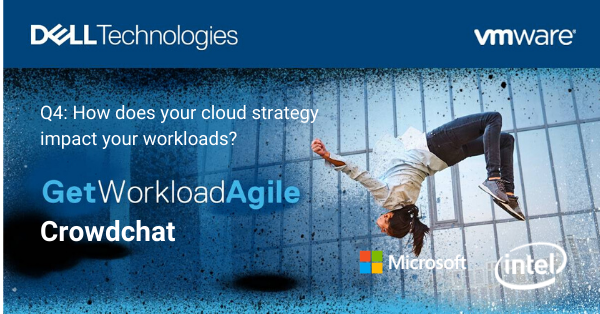Q1: New technologies and business models are accelerating the need to be agile. In fact, IDC expects 175 trillion GB of data by 2025. What implications does this huge increase of data have on workloads? https://www.crowdchat.net/s/45zqx

Paul Brook
Hi everyone, lets ask around why are we talking Agile workload today?

Garry Owen
Like everything else in the industry, it strongly underpins the need for digital transformation. Infrastructure designed on principles developed 25 years ago certainly won't work optimally in a world of such growth

werner schueler
The implication of the explosions of Data are huge! Revolutionize health and safety with technology #iamintel #RiseWithUs

werner schueler
The implication of the explosions of Data are huge! Revolutionize health and safety with technology #iamintel #RiseWithUs

Artur Trapizonyan
The data explosion is resulting in new business and workload requirements. In fact, IDC say that Workload placement separates the winners from the losers in IT. When we talk about placement that means either IaaS, CaaS or PaaS. - https://bit.ly/idc_workloads

Mark Mulvany
Have to agree with Gary not only is it the infrastructure but also procedures and the way we work needs to change.

Vladimira Vodzinska, PhD
#DellTech, we believe that Workload Agile means: 1. a data-first architecture capable of handling different types of applications and data and 2. different compute demands and outcomes from the edge to the core to the cloud

Paul Brook
Yes, imagine trying to run a business using a 1970's phone system

Artur Trapizonyan
So, what needs to happen? How can we help CxO’s?

Rory Choudhuri
Data has always increased, typically 50% year over year. The challenge remains how to extract value from your data. Secondarily, how to scale to store, move, protect that data.

Garry Owen
We struggle to predict what's going to happen in the next 18 months - COVID a perfect example - so implementing an infrastructure that's designed to address a relatively fixed future is futile. The 'new infrastructure' needs to be flexible enough to accommodate whatever comes

Mark Mulvany
Good question it all comes down to understanding the workload hence the focus on #Getworkloadagile

Paul Brook
As Gary suggests the Digital universe is super intertwined with the real world, and everything is moving at a pace.

Paul Brook
OK I am going to throw this out. Difference between flexible and Agile please?

Vladimira Vodzinska, PhD
THE writer of bestsellers is talking :)

Mark Mulvany
I think for me flexibility doesn't always mean agile.

Paul Brook
Is it that Agile links into the business needs and the flexibility is very much internal or IT systems focused

Rory Choudhuri
@PaulBrookatData For me, flexible means able to handle multiple different types of workload. Agile refers more to speed of response to challenge and change.

Garry Owen
... and as per Mark and Paul's points, this isn't just a technology question. Culture is at least as important. IT is becoming a true teamsport, involving perhaps previously unexpected stakeholders, such as HR, Legal, even Facilties

Mark Mulvany
Yes I would agree agility is something that needs to evolve constantly and not really about individual technologies but more about business benefits

Suhela Dighe
.@garryo130 That is so true! In fact, every discussion I've seen recently highlight company culture as a key factor in driving digital transformation and all that entails.

Rory Choudhuri
@garryo130 Critically, breaking down silos, and driving virtual and disparate teams to work together to a common goal. Communication, previously important, just became importanter!

Paul Brook
Rory- much better way of saying it. I agree. Thanks

werner schueler
I agree Companies cultures have to evolve and adapt where technology can help to drive the culture change and therefore the business competitiveness #iamintel

Garry Owen
Yes - 'Agile' refers to outcomes, 'Flexibility' is about how you produce those outcomes against a background of constant uncertainty

Garry Owen
Strangely, COVID may turn out to help in this regard. It's forcing people to use collaboration tools, and to work remotely. Perversely, this increased willingness to use tools such as Teams, Zoom, etc may help employees that were reluctant to do so before

Suhela Dighe
.@garryo130 I agree, this pandemic is definitely a catalyst to embrace new technologies, at home & in your business. Absolutely! Organisations are re-allocating budgets to become both agile and remain flexible for unknown future demands. It's the perfect storm for transformation.





